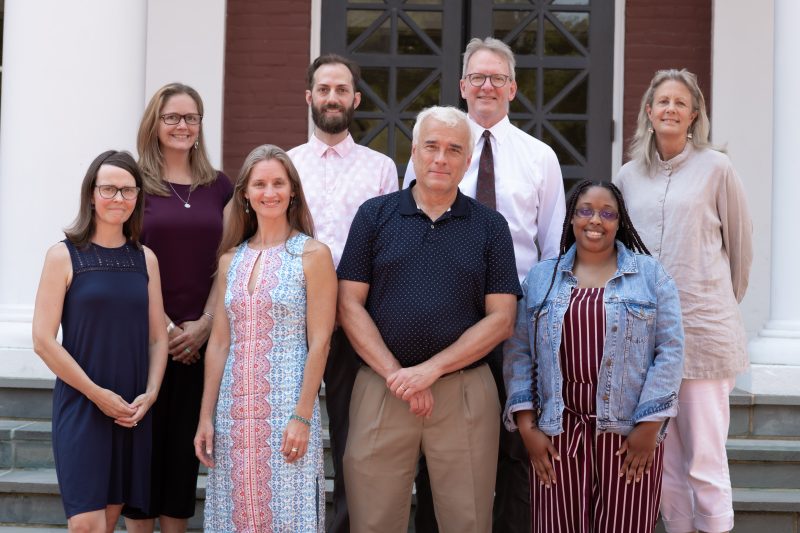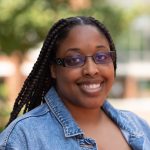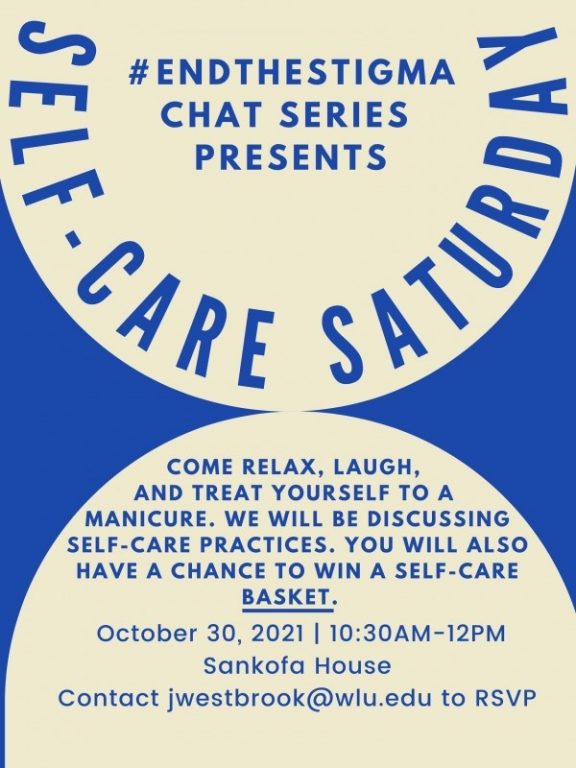‘Committed to This Cause’ Against a national backdrop of mental health concerns, Washington and Lee's University Counseling Center recently rolled out new programs to increase the ways in which students can reach out for help.
“Sometimes the most important step toward good mental health is realizing the importance of taking care of yourself and committing to trying new things that might help.”
~ Jeff Rutter, W&L Counseling Center director
Fifteen years ago, one in seven U.S. college students met the criteria for a clinically significant mental health problem.
Today, according to a study by the Healthy Minds Network, that figure is one in three.
The increase has been attributed to a variety of factors, including smartphone culture, social media and greater awareness of mental health in general. No matter the cause, the implications for higher education are clear: Colleges and universities must have ample mental health resources that are easily accessible to students.
Fortunately, Washington and Lee University’s Counseling Center has a large, diverse and caring staff that is working to significantly increase the ways in which students can reach out for help. In addition to in-person counseling at the center, students can seek assistance in two new ways: by attending casual sessions at satellite locations around campus through a new program called Let’s Talk, or by using My Student Support Program (My SSP), an app-based mental health service that offers private, round-the-clock support.
“W&L is among the finest universities in the country in terms of its commitment to student mental health,” said Jeff Rutter, a clinical psychologist and W&L’s new director of counseling. “Our leadership and our alumni are absolutely committed to this cause, and with key new resources in place, such as Let’s Talk and My SSP, we are able to increase our support for students without exceeding our physical space limitations or staff availability.”
At the University Counseling Center, which is located inside Early-Fielding on the W&L campus, staff help students with a wide variety of concerns, including anxiety, depression, body image and eating disorders, alcohol and drug problems, perfectionism, relationship and sex issues, and anger management. Counselors there are able to triage and assess clients, do a psychiatric evaluation, conduct individual or group counseling, and manage medication. They also do crisis intervention and outreach, and can refer students to other practitioners. The fact that a student is seeking counseling is kept in strictest confidence with only two exceptions: If they pose a risk of imminent harm to themselves or others, or when they disclose that a child or elderly person has been neglected or abused.
Like other counseling centers in higher education settings across the country, W&L’s center has experienced a steady increase in demand for services over the past 15 years. In academic year 2015-16, it served 434 students, and by 2018-19, that number had risen to 534. Last year’s number dipped to 451 students, a decrease that can be attributed to COVID-19. When the pandemic forced W&L to go virtual to protect community health, students living at home were less likely to reach out to university counselors for a number of reasons, including a family stigma against therapy, greater support at home or perhaps access to other resources. This year’s numbers are on track to continue the upward trend.
“Being on Zoom and having a lot of things virtually, people definitely felt a sense of isolation.”
~ Hal Fant ’22
There is no question that the pandemic had an impact on mental health, although the degree to which that will linger remains unclear. A Centers for Disease Control study in 2020 revealed considerably elevated adverse mental health conditions among U.S. adults, with younger adults among the subsets reporting worse mental health outcomes and increased substance abuse. Of respondents aged 18-24, 74.9 percent reported at least one adverse mental or behavioral health symptom.
“Being on Zoom and having a lot of things virtually, people definitely felt a sense of isolation,” said Hal Fant ’22, president of W&L’s chapter of Active Minds, a group dedicated to mental health awareness. “It can lead you down a downward spiral, but I think it’s getting better as the number of cases subside and things are slowly getting back to normal.”
At W&L, students benefit from a university counseling center staff that is about 25% larger than that of similar schools. It can take up to six weeks to see a counselor in the outside community, but W&L students often wait less than a week. The center’s staff was recently expanded to include Rutter’s newly created director position, and they hope to add another clinician in 2022. The staff will then include two clinical social workers, two clinical psychologists, a professional counselor, two residents in counseling and a part-time psychiatrist, all of whom work directly with students. All of the staff are qualified and committed to helping with diversity and inclusion concerns.
“Our strategic plan says that we will have a staff that is deep and diverse, and deep for us means having experience and being able to address whatever need walks through the door,” Rutter said. “Diverse for us means we really need to think about gender balance, about LGBTQ-friendly therapists–not just affirming, but identifying– and about minorities who may be more inclined to work with someone who looks like them.”
Jade Westbrook, a resident in counseling at W&L, leads a bimonthly support group for minority students that allows them to talk about their experience at W&L and events that occur on campus. The group also talks about topics such as racism, colorism, alcohol and drug use, and healthy relationships.
“Not that many minority students come to the counseling center, and that’s the problem. The biggest stigma against counseling is in BIPOC communities,” Westbrook said, referring to communities of Black, Indigenous and People of Color. “They are looked at as weak for needing counseling by their parents or father figure, but the truth is, you are strong for recognizing that need.”
In addition to leading group meetings, Westbrook is working with Fiorela Giraldo Prado de Lewis, program coordinator for W&L’s Office of Inclusion and Engagement, to take that message into the student community through a new chat series called #endthestigma. The series, which will partner with student organizations such as the Latin Student Association, Native American Cohort and Student Association for Black Unity, will include events such as the recent Self-Care Saturday at Sankofa House. For that event, students were invited to relax with manicures.
“None of the students take time for themselves,” Westbrook said. “They think self-care is just putting down the book for the night.”
This academic year, in an effort to reach more students in need of help and to relieve pressure on an increasingly overburdened counseling staff, the center has introduced two exciting initiatives: Let’s Talk and My SSP.
Let’s Talk is a free, confidential program that allows students to have casual chats with counselors at various locations around campus. Students need not make an appointment or fill out paperwork, and there is little-to-no wait time for these informal consultations. It’s an effective way to find support, gain perspective and explore additional resources. These satellite locations also may appeal to students who are reluctant to be seen at the counseling center. Every weekday, a counselor is available at a different location, including Red House, which is home to the LGBTQ Resource Center; the Duchossois Athletic Center; Lewis Hall at the School of Law; the Office of Inclusion and Engagement; the Harte Center; or Leyburn Library. (See sidebar for a detailed schedule.)
My SSP is an exciting new multilingual, app-based service operated by a third-party vendor that connects students with free, confidential emotional health and well-being support. Through the My SSP app, students can connect with experienced mental health professionals on a drop-in basis at any time of day via chat or phone, or on a scheduled basis via video conferencing.
“The biggest thing about My SSP is that it’s completely anonymous, and I think that will appeal to a lot more people,” Fant said. “I think one of the biggest barriers to seeing a therapist is allowing other people to see that you are actually going to get therapy because there can be such a stigma around receiving therapy. Being in the comfort of your own bedroom … I think that will appeal to a lot of people.”
“We’re committed to supporting the university to proactively encourage student well-being especially as it relates to mental health.”
~ Kelly Golub ’93
W&L is able to participate in My SSP because of a generous donation from Greg Golub ’94 and his wife, Kelly Golub ’93.
“It is our hope that through technology, the great work being done by the University Counseling Center can reach more students when and where they need it,” Kelly Golub said. “We’re committed to supporting the university to proactively encourage student well-being especially as it relates to mental health.”
“My SSP is just an incredible addition to our suite of resources,” Rutter said, “and it is incredible that the Golubs and W&L have gifted it to us.”
All of these professional services are complemented by the support that W&L student volunteers offer their fellow students through programs like peer counseling, Active Minds and the Washingtonian Society. This student support network can serve as a safety net and referral system for students who are just beginning to experience problems, don’t know about the counseling center’s many resources, are ashamed to ask for professional help, or just feel more comfortable talking to peers. Read more about these students and resources here.
The University Counseling Center staff at W&L does not feel strongly about how students reach out for help, but they fervently hope students know that help is readily available — and only as far away as a short walk, a phone call, a knock on the door, a mouse click or a few taps of the smartphone screen.
“Mental health is really all about finding what works for you. It’s not a one-size-fits-all type thing,” Rutter said. “Sometimes the most important step toward good mental health is realizing the importance of taking care of yourself and committing to trying new things that might help.”
Let's Talk and My SSP
Let’s Talk Locations and Hours
Let’s Talk is a free, confidential program available to students at various locations across campus. No appointment is necessary, and there is no paperwork to complete. Visits are first-come, first-served, and the wait time to see the Let’s Talk counselor is usually very brief. All students are welcome to visit Let’s Talk.
Speaking with a counselor in a confidential setting can help you access support, provide perspective, explore resources and options, and discuss how counseling might be helpful. Let’s Talk is designed for students who want to talk to a counselor casually. It is not appropriate for students who need urgent help. If you are in crisis, please call the University Counseling Center at 540-458-8590.
Monday: Red House, 2-3 p.m.; Harte Center for Teaching and Learning, Room 140, 11 a.m.-noon
Tuesday: Duchossois Athletic Center, Room 379, 1-3 p.m.
Wednesday: Lewis Hall, Room 485, 10:30 a.m.-12:30 p.m.
Thursday: Red House, 1-2 p.m.; Duchossois Athletic Center, Room 379, 3-5 p.m.
Friday: Leyburn Library, Room 220, 1-2 p.m.
Click here for more information.
My SSP
My SSP (My Student Support Program) is a FREE confidential online counseling service offering mental health support and wellbeing resources for ALL Washington and Lee students via text, phone, or video 24/7. My SSP complements W&L’s existing counseling services. Talking to an experienced professional at the right time can make a positive difference. My SSP is here to help you succeed.
My SSP resources and professional counselors can help you address common concerns such as:
- Relationship issues
- Feelings of isolation, loneliness, sadness, or homesickness
- Stress, frustration,concerns or uncertainty about any aspect of their life
- Adapting to a new campus culture, learning style or city
- Anxiety about upcoming exams or disappointment with academic performance
- Creating balance between personal and academic priorities
- Procrastination and building time management skills
- Tensions with family members, friends, or roommate
How to Access My SSP
You can access real-time support or schedule an appointment for short-term support with a My SSP counselor by:
- Downloading the My SSP app from App Store or Google Play
- Visiting the My SSP website
- Calling toll free 1-866-743-7732 (if calling from outside the US, call 001-416-380-6578)
 University Counseling Center staff. Front row, l-r: Janet Boller, PsyD; Rallie Snowden, LCSW; Kirk Luder, MD; Jade Westbrook, MS. Second row, l-r: Jesse Paul, administrative assistant; Dave Salge, MEd; Jeff Rutter, PsyD; Sharron Arbuthnot, LCSW.
University Counseling Center staff. Front row, l-r: Janet Boller, PsyD; Rallie Snowden, LCSW; Kirk Luder, MD; Jade Westbrook, MS. Second row, l-r: Jesse Paul, administrative assistant; Dave Salge, MEd; Jeff Rutter, PsyD; Sharron Arbuthnot, LCSW. Jeff Rutter, counseling center director
Jeff Rutter, counseling center director Jade Westbrook, resident in counseling
Jade Westbrook, resident in counseling Poster for a recent #endthestigma chat series event.
Poster for a recent #endthestigma chat series event.
You must be logged in to post a comment.